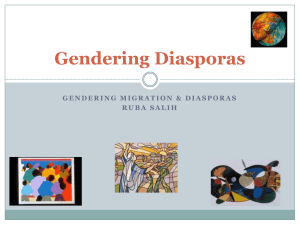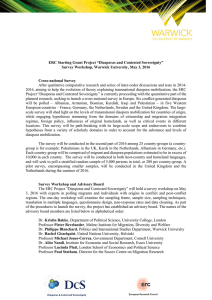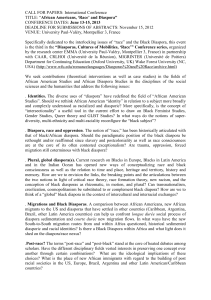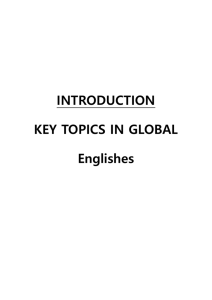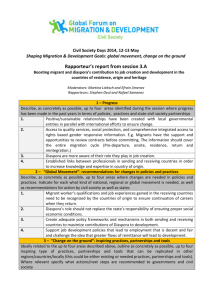Koinova, Maria (2012) Autonomy and positionality in diaspora politics. International
advertisement
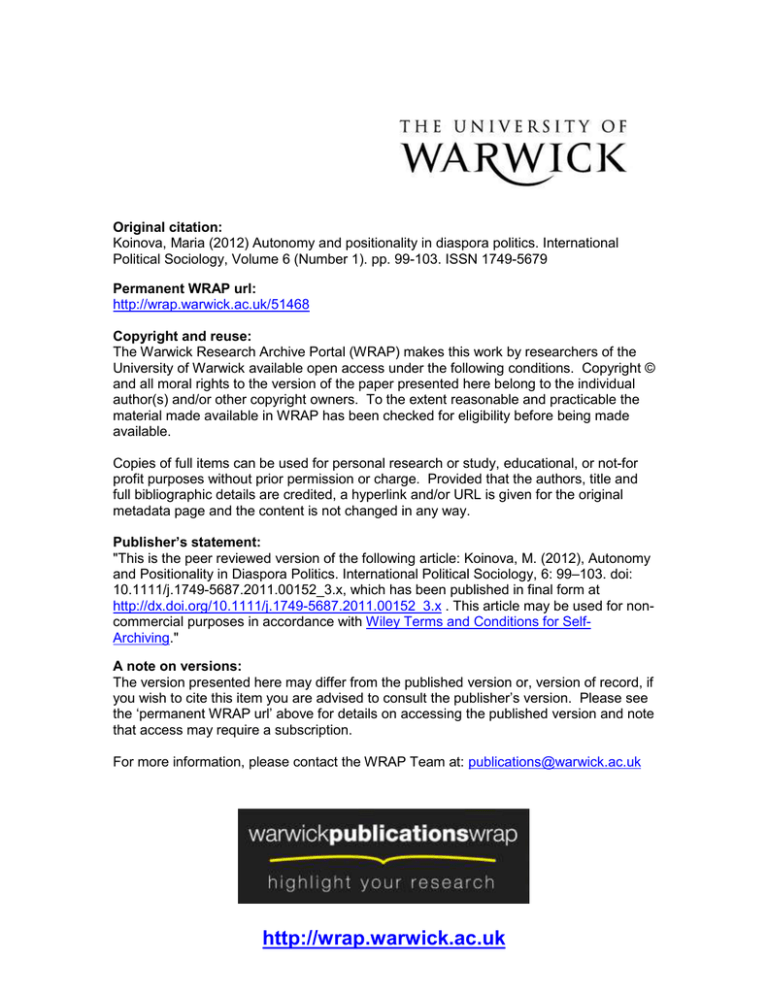
Original citation: Koinova, Maria (2012) Autonomy and positionality in diaspora politics. International Political Sociology, Volume 6 (Number 1). pp. 99-103. ISSN 1749-5679 Permanent WRAP url: http://wrap.warwick.ac.uk/51468 Copyright and reuse: The Warwick Research Archive Portal (WRAP) makes this work by researchers of the University of Warwick available open access under the following conditions. Copyright © and all moral rights to the version of the paper presented here belong to the individual author(s) and/or other copyright owners. To the extent reasonable and practicable the material made available in WRAP has been checked for eligibility before being made available. Copies of full items can be used for personal research or study, educational, or not-for profit purposes without prior permission or charge. Provided that the authors, title and full bibliographic details are credited, a hyperlink and/or URL is given for the original metadata page and the content is not changed in any way. Publisher’s statement: "This is the peer reviewed version of the following article: Koinova, M. (2012), Autonomy and Positionality in Diaspora Politics. International Political Sociology, 6: 99–103. doi: 10.1111/j.1749-5687.2011.00152_3.x, which has been published in final form at http://dx.doi.org/10.1111/j.1749-5687.2011.00152_3.x . This article may be used for noncommercial purposes in accordance with Wiley Terms and Conditions for SelfArchiving." A note on versions: The version presented here may differ from the published version or, version of record, if you wish to cite this item you are advised to consult the publisher’s version. Please see the ‘permanent WRAP url’ above for details on accessing the published version and note that access may require a subscription. For more information, please contact the WRAP Team at: publications@warwick.ac.uk http://wrap.warwick.ac.uk This is an Author's Accepted Manuscript of the article: Koinova, Maria (2012). “Autonomy and Positionality in Diaspora Politics” International Political Sociology, Vol. 6, No. 1, pp. 99-103. Contribution to the Forum: “Diaspora Politics and IR: Do We Need to Rethink the Theory?” International Political Sociology, Guest editor Dr. Francesco Ragazzi Article available online at: http://onlinelibrary.wiley.com/doi/10.1111/j.17495687.2011.00152_3.x/abstract 1 Autonomy and Positionality in Diaspora Politics by Dr. Maria Koinova, Assistant Professor, University of Amsterdam, Email: m.v.koinova@uva.nl 2 Introduction During the past decade few scholars have been seeking to establish viable theoretical connections between diaspora politics and international relations theory. Reaching to classic IR paradigms, Shain and Barth argued that constructivism can account for the diasporic identities, motives and preferences, and liberalism – for their actions once preferences are settled (2003:451). Adamson and Demetriou challenged a widely accepted assumption in IR that there is a “fit” between a national and state identity. They proposed that IR treats the concept of “diaspora” as a useful tool to contrast the deterritorialized and network-based collective identities of diasporas with the territorially defined and institutionalized collective identities of states (2007:491). A third group focused on the autonomy of diasporas vis-a-vis their original homelands. Diasporas are seen as either autonomous agents in world politics (Shain 2002)), or more passively accepting pressures from their original homelands seeking to expand their governance over their identity-based populations abroad (Haegel and Peretz 2005, Ragazzi 2009), or acting as both depending on the location of the main mobilizing agents (Shain and Barth 2003, Koinova 2009, 2011, Lyons and Mandaville 2010). Most of these authors also acknowledge that diasporas should not be treated as monolithic entities, but the concept needs to be “unpacked” to account for the activities of diasporic individual actors, institutions and networks. The latter is easier said than done in theoretical terms, since major IR theories – and especially realism and liberalism – are not well equipped to account for international relations involving ethno-national diversity on levels different than the “group.” Hence, they essentialize diasporas. This contribution does not aspire to solve this major challenge. It only offers a step further into a better understanding of how the autonomy of agents within 3 diasporas and their positionality in different states and/or international organizations influence the interactions between diasporas and states in international politics. I argue that regardless of how strongly original homelands aspire to govern their populations abroad, powerful diaspora individuals, institutions, and networks enjoy a relative autonomy vis-a-vis their homeland. Their autonomy is a matter of degree, depending on their abilities to extract resources independently of the home-state or networks linked to it, and to maintain legal status in another state that precludes their unwanted return or institutional closure. Apart from their autonomy, their positionality in a given context renders them with specific power vis-a-vis other relevant political actors – such as the majority in a host-state, other powerful lobbies, other segments of the diaspora network, and other relevant international networks. Positionality is an important, yet little understood concept in diaspora politics. Autonomy of Diaspora Agency The autonomy of powerful individuals is most visible with political entrepreneurs who have made their professional success without participation in homeland businesses, politics, or academic networks, and who enjoy official legal status in another state. In the aftermath of the Cold War the Hungarian-American financial magnate George Soros built the Central European University in Budapest, and a dense network of foundations to sponsor democratization projects across the communist world, expanding recently also to Africa and Asia. Although his policies were considered pro-American, they did not always go parallel with the US administrations or with the Hungarian governments. On a smaller scale, journalist John-Dimitry Panitza created a foundation to sponsor democratization, excellence in journalism, and an academy for politicians in his home-country Bulgaria. The 4 agricultural economist Djime Adoum has been leading an international effort to bring peace and good governance in Chad (Brinkerhofff 2009). The relative autonomy of these agents from the home-state could slightly decrease in the process of interactions with host-state officials and their networks, but remains intact. Panitza, for example, declined his honorary doctorate from the Bulgarian Academy of Sciences in 2010 after it was disclosed that numerous communist-era secret service agents were still employed by the academy (Democracy Digest, 08/05/2011). Diasporic institutions have different autonomy in their ability to solicit funds, instrumentalize interests, and frame meanings vis-a-vis homeland politics. Institutions of the Iranian diaspora, for example, and especially their global media outlets in Los Angeles, are autonomous political entrepreneurs seeking regime change in Iran. Their funding, membership, and audience are solicited almost exclusively from diaspora circles. The situation is not as clear when sovereignty movements are at stake. Fair argued that diaspora institutions built specifically for conflict purposes from the original homeland rather than adapted for the nationalist struggle in the host-land are more effective at fostering radical attitudes (Fair 2005). Looking into the institutions of the Palestinian diaspora after the 1993 Oslo Accords, one could claim that much of the diaspora mobilization is driven by the domestic politics of the emerging Palestinian state. Divisions and more recently unification between the two major protagonists, Fatah and Hamas, become transnationalized in diaspora circles. However, a closer look into the plethora of diasporic institutions reveals different degrees of autonomy from the domestic processes. For example, Medical Aid of Palestinians, a 25-year old institution in the UK, seems to enjoy certain autonomy. It has enjoyed support by the UK-based Palestinian business-community to deal with humanitarian emergencies and long-term health issues in the West Bank, Gaza, and 5 the camps in Lebanon. Also, the Palestinian Solidarity Campaign (PSC), a British movement with European-wide networks and leftist inclinations, engages Palestinians in the diaspora and other nationalities for lobbying and boycotting of Israeli goods (Koinova, 2009). These organizations do not depend on funding from domestic Palestinian networks and enjoy relative autonomy to frame the conflict in humanitarian (Medial Aid) or leftist (PSC) terms. The autonomy of diaspora networks is the most questionable and difficult to discern, not least because networks span diaspora circles, homelands, host-lands, international organizations, and other countries’ contexts where diasporas reside. Especially with the advent of Facebook, YouTube, and Twitter information has been spreading instantly throughout networks, and symbols have been evoked for mobilization purposes. Nevertheless, apart from “information” and “symbolic” functions, which networks perform to persuade and socialize, some parts of the network also exercise “leverage” to influence powerful actors, while other parts of the same network are unlikely to do so (Keck and Sikkink 1998:16). Hence, not all parts of the network are equal in strength nor are they equally exposed to direct intervention from the home-state. Some network segments enjoy greater autonomy. Albanians’ activism for Kosovo independence illustrates this point well. In the early 1990s the non-violent movement of the Democratic League of Kosovo (LDK) created its own branches in the US, Europe, and Australia to internationalize the Kosovars’ abuse from the Milosevic regime. These were highly directed networks. However, the networks of the Kosovo Liberation Army (KLA), which advocated armed revolt as of the mid-1990s, were a coalition of several autonomous networks, opposed to LDK’s inability to achieve secessionism. At their core was an initially loose network of individual activists with Marxist inclinations based in Switzerland 6 and Germany who advocated armed insurgence already in the early 1980s. The larger KLA network grew by incorporating other autonomous ones after the 1995 Dayton accords failed to deliver a solution for Kosovo and the human rights abuse intensified on the ground. Most notably, the US-based network, which was added to the movement in the mid-1990s, was built of business entrepreneurs who were ideologically opposed to the Marxism of their European counterparts. Finally, in 1998-1999 the KLA managed to convert to their cause major parts of the already existing LDK network. Positionality in Diaspora Activism In a recent piece in this journal, Lyons and Mandaville argued that diaspora activists may form a global political movement around shared ideas and goals, but they act alongside logics of “division of labor” within segments of their network. Each network part has a specific “comparative advantage” over others due to being situated in a specific territory that is prone to engage strategically through either lobbying, fund-raising, or using media (2010:128, 132-133). The authors touch upon an important phenomenon in diaspora politics, which needs more theoretical elaboration, and which could be well addressed by the concept of “positionality.” The term was originally developed in anthropology and sociology to articulate that “gender, class, and other aspects of identities are markers of relational positions rather than essential qualities” (Maher and Tetreault, 1993:118). I have earlier discussed that in diaspora politics the term “positionality” refers to the relative power that diaspora entrepreneurs perceive as deriving from their social positions occupied in a specific context (Koinova, 2009). Positionality is both a perceptual and relational category. 7 In diaspora politics power is derived not only from material and symbolic resources as classic IR accounts would argue, but from the social position diaspora entrepreneurs occupy vis-à-vis other actors. The context of reference could be a territorial place – the nation-state considered important in classic IR theories, or the city as recently Adamson and I have argued – but also a transnational spatial or imagined location. Diaspora entrepreneurs consider that their social position is one of strength on the basis of relational characteristics such as: 1) proximity to the majority race and religion, 2) lack of blockage to political participation stemming from other powerful lobbies (Koinova 2009), 3) comparative advantage of place visà-vis other segments of the network (Lyons and Mandaville 2010, Koinova 2011), 4) connectivity to other transnational networks with regard to political mobilization. While these relational characteristics are not exhaustive, they serve well to demonstrate the utility of the concept of “positionality” in analyzing diaspora politics. The case of Palestinian diaspora entrepreneurship provides ample evidence to substantiate these claims. In my interviews from 2009 and 2010 in London, diaspora entrepreneurs from different parts of the political spectrum argued that they considered their position in the UK weak with regard to the majority because of racial discrimination and the politicization of Islam. In comparison to other politically mobilized groups – such as Armenians or Albanians – Palestinian entrepreneurs derived less power from their position in this country. Also, they considered that the existence of a strong Israeli lobby is blocking their access to effective political participation (Koinova, 2009). Nevertheless, they considered other elements of their positionality in the UK as enhancing their power in a global network. In terms of territorial place, London could be named a “media capital” of the Arab world with a plethora of Arabic-language outlets, including major British ones such as the BBC 8 and the Guardian covering international affairs (Adamson and Koinova 2011). Hence, Palestinian entrepreneurs often prefer to use protest rather than lobbying as a mode of mobilization, since protest receives more coverage in the media (Koinova 2009). Assessing the relationship to other segments of the global network, positionality in the UK gives a serious advantage, especially in comparison with the US. In the US the Israeli lobby is even more influential, and the media coverage is less favorable for Palestinian affairs. Also, Islamic networks have been stronger in the UK, often appropriating the plight of the Palestinians for their own political mobilization (Adamson and Koinova 2011). Hence, in this context Palestinian networks find more easily compatibility with Islamic ones than in the US. Conclusions This short essay aimed to demonstrate that emerging theorizing about diasporas and international politics needs to account for the autonomy and positionality of diaspora agency. The agency is not endowed in groups as mainstream IR theorizing would posit, but in powerful diaspora individuals, institutions, and networks, each of which enjoys different degrees of autonomy from the original homeland. Hence, generalizations that diasporas are either non-state actors, or are directed by states who aspire to control their populations abroad need more scrutiny. Also, each of these actors enjoys certain positionality in a given context, which endows them with power based on the social position they occupy. Positionality needs to be factored into IR theorizing, especially because the discipline needs to advance to better understand the international politics of individuals and networks. 9 References Adamson, Fiona and Madeline Demetriou. 2007. “Remapping the Boundaries of “State” and “National Identity.” European Journal of International Relations 13 (4): 489–526. Adamson, Fiona and Maria Koinova 2011. “The Global City as a Space for Transnational Identity Politics,” Paper presented at the APSA Annual Meeting Seattle, WA, September 1, 2011. Brinkerhoff, Jennifer. 2009. “The Diasporan as Political Entrepreneur,” Paper presented at the “Explaining Diaspora Politics” Workshop, SOAS, London, October 30-31, 2009. Democracy Digest. 2011. “Dimi Panitza, 1930-2011”” August 5, http://www.demdigest.net/blog/2011/08/dimi-panitza-1930-2011/ Fair, Christine. 2005. “Diaspora Involvement in Insurgencies,” Nationalism and Ethnic Politics 11 (1): 125-156. Haegel, Peter and Pauline Peretz. 2005. “States and Transnational Actors”” European Journal of International Relations 11 (4): 467-493. Keck, Margaret and Kathryn Sikkink. 1998. Activists Beyond Borders: Ithaca, NY: Cornell University Press. Koinova, Maria. 2009. “Why do Conflict-Generated Diasporas Pursue Sovereigntybased Claims through State-based or Transnational Channels?” Paper presented at the “Explaining Diaspora Politics” Workshop, SOAS, London, October 30-31, 2009. Koinova, Maria. 2011. “Four Types of Diaspora Mobilization”, Paper presented at the APSA Annual Meeting, Seattle, WA, September 2, 2011. 10 Lyons, Terrence and Peter Mandaville (2010). “Think Locally, Act Globally,” International Political Sociology 4: 124-141. Maher, Frances and Mary Kay Tetreault, 1993. “Frames of Positionality,” Anthropological Quarterly 66 (3): 118-126. Shain, Yossi. 2002. “The Role of Diasporas in Conflict Perpetuation and Resolution,” SAIS Review, 22 (2): 115-144. Shain, Yossi and Ahron Barth. 2003. “Diasporas and International Relations Theory,” International Organization 57 (Summer): 449-479. Ragazzi, Francesco. 2009. “Governing Diasporas,” International Political Sociology, 3 (4): 378-397. 11
